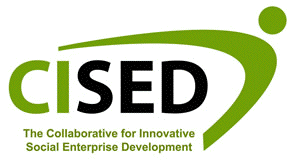You’ve got a great idea for a business that would help make the world a better place. Or you think your nonprofit could sell some services to bring in additional revenue. In other words, you might have a social enterprise in the making. But where do you start?
In Ottawa, you start with the Collaborative for Innovative Social Enterprise Development (CISED). CISED helps individuals and organizations at every stage of their social enterprise, linking them with advice, training, financing and technical resources.
A spectrum of supports for social entrepreneurs
CISED began in 2009 as a collaborative initiative among six agencies.1 Through a partnership with Enterprising Non-Profits (enp), CISED also offers a Build Your Social Enterprise Workshop for nonprofits, which are then eligible to apply for Mission Multiplier grants, a matching grant program that provides up to $5,000 to hire technical expertise in business development. CISED also hosts learning and networking events.
The first step for social entrepreneurs seeking assistance is often a conversation with Jonathan Wade, CISED’s social enterprise sector developer. Coaching is a significant part of CISED’s training and grant programs. That ongoing support is crucial for organizations that are enthusiastic about social enterprise but hampered by institutional, human resource, financial or legal constraints, says Wade.
A valued resource
One organization that’s made good use of the combined expertise, financing and coaching that CISED brings is the Canadian Centre for International Justice (CCIJ). CCIJ, a nonprofit, charitable organization, helps survivors of genocide, torture and other serious human rights violations seek justice.
Jayne Stoyles, CCIJ’s executive director, is well acquainted with social enterprise as an Ashoka Canada fellow. Still, she says, exploring social enterprise options “really required a different level of human and financial resources.” Stoyles sought advice from CISED, which guided her to apply for a Mission Multiplier grant that covered part of CCIJ’s market research costs. Wade helped Stoyles find a consultant, explore financing sources and identify advisors. “It was quite a range of services, really – excellent connections and feedback and ideas,” comments Stoyles.
As a result, CCIJ is creating an institute that will offer continuing professional development training to lawyers and others interested in international justice. It’s a social enterprise that supports CCIJ’s social mission and uses its expertise and networks. “All of the revenue will come into our charity to pay for the services that we’re providing to survivors of torture,” says Stoyles.
A sounding board
Anthony Toffoli has established several businesses in more than 20 years of working internationally, including his global events and exhibition management services company, and an adventure travel business. He’s also created a social enterprise, thanks to his business and networking skills and some feedback from CISED.
Toffoli, whose wife is a Foreign Affairs officer, has lived as an “accompanying spouse” in several countries. It’s brought him work and personal challenges as well as opportunities, and led him to create Spouses Without Borders, an organization that provides career and related support to spouses of people posted overseas.
Toffoli, along with Gareth Jones and a few other people with experience as accompanying spouses, began planning Spouses Without Borders as a business, but after Toffoli heard CISED’s Jonathan Wade speak at a seminar last year, he realized that Spouses Without Borders could be a social enterprise. “I’ve set up companies, but I’ve never set up anything to do with social enterprise,” says Toffoli. “So I met with Jonathan one on one and explained what we wanted to do. And he said you’re on the right track. I was very happy to hear that, because it has always been my vision to make this an organization that would be sustainable, self-financed, but not necessarily a profit-maker for me personally.” Guided by this vision, Spouses Without Borders is developing a business plan and has launched its first activities.
Support for creative thinking
ComputerWise, a program of the nonprofit charity Ottawa Foyers Partage, provides skills development and work opportunities for clients with disabilities. “We empower people through adaptive technology,” explains program supervisor Laura McCrae. ComputerWise’s clients do word processing, data entry and other office operations, and undertake small contracts for services such as desktop publishing.
To explore whether it could increase that small revenue base, ComputerWise approached CISED. Through a Mission Multiplier grant, ComputerWise hired a consultant to develop a business plan. What they learned was that they didn’t really have a viable social enterprise. “We found that we’re pretty much at capacity or almost at capacity in terms of hours available to do more work,” explains McCrae.
Nonetheless, says McCrae, CISED’s support helped ComputerWise clarify its focus, products and market. “Part of this process was learning what we really are, which is a nonprofit that generates a small revenue. We work with a very unique clientele, because the people who work with us have multiple disabilities. What we want is to create meaningful work experiences for them. If we bring in more revenue that’s fantastic, but we’ll consider it a success if the clients are feeling fulfilled.”
A unique vantage point
After four years, CISED is well-positioned to help social enterprises think through opportunities and challenges. For example, CISED is looking at social procurement as a way to help social enterprises finance their operations. On March 7, CISED will host Buy Social, a business-to-business networking event. It’s also assisting individual enterprises to negotiate purchasing contracts and is exploring community benefit agreements between social enterprises and buyers.
A new, agile structure
The informal partnership among its founding agencies brought a wealth of people and resources together, but Wade says after reviewing the options, CISED will be incorporating as a nonprofit, enabling it to apply for grants and expand its partnerships. These include Impact Academy, a workshop and peer support series in collaboration with Hub Ottawa, and continued collaboration with enp, with an upcoming Build Your Social Enterprise Workshop on April 11, and further Mission Multiplier grants in 2013 and 2014 thanks to new federal funding to enp. It’s an exciting time for CISED, and for the social enterprises it supports.
________________________
Founding partners are Causeway Work Centre, Ottawa Community Loan Fund, Carleton Centre for Community Innovation, Algonquin College, Réseau de développement économique et d’employabilité (RDÉE), Vanier Community Service Centre, and a private sector entrepreneur. Hosted by Causeway, CISED received an initial three-year grant from the Ontario Trillium Foundation.Denise Deby is a freelance writer and program management and evaluation consultant who specializes in social, environmental and international issues. You can find her at denisedeby.wordpress.com.


